
* Expecting the presence of esteemed guests, including MPs, Blantyre City Mayor, senior police officers, members of the Judiciary, the media
* Also invited are members of the clergy, human rights activists, civil society leaders and various other prominent community members
By Duncan Mlanjira
The Palestinian Solidarity Movement in Malawi will tomorrow observe the International Day in Solidarity for Palestinian People, which fell on November 29 to create awareness about the challenging circumstances faced by the Palestinian people through the Israel/Hamas war.

Advertisement
A an invitation from the Movement’s national coordinators, Asaboni Phiri and Abbas Panjwan says they are expecting the presence of esteemed guests, including Members of Parliament, Blantyre City Mayor, senior police officers, members of the Judiciary, media practitioners, members of the clergy, human rights activists, civil society leaders, and various other prominent members of the community — who have all been invited to attend.
“The Palestinian Solidarity Movement here in Malawi is a dedicated group of individuals committed to promoting peace, justice and respect for fundamental human rights,” says the invitation to the rest of the members of the public.
“The purpose and objective of this event are deeply rooted in creating awareness about the challenging circumstances faced by the Palestinian people.
“Against the backdrop of recent atrocities committed by the apartheid state of Israel, recognized as acts tantamount to genocide and ethnic cleansing, we aim to shed light on these issues as clear violations of international law.”

Advertisement
The day’s events program will delve into crucial discussions, including an exploration of the boycott, divestment and sanctions (BDS) movement and the Movement further says they are “privileged to host a presentation by Gift of the Givers, a leading international NGO actively engaged in addressing humanitarian needs in Palestine”.
“The program will include various activities, with a special highlight being a thought-provoking film screening. We believe this event will be both informative and impactful, contributing to the awareness and support for the Palestinian cause.
“Your presence at this event will not only contribute to its success but also demonstrate solidarity with the cause of justice and awareness for the Palestinian people,” said the invite, while asking to contact Asaboni Phiri on +265 990 081 5 85 or Abbas Panjwani on +265 999 826 666 for more inquiries.

Since the crisis in Gaza reached an unprecedented levels, that has claimed thousands of lives, the Palestinian Solidarity Movement in Malawi has been organising awareness and solidarity meetings.
In October an incredible number of over 80 participants graced the Movement’s vigil that was held at Malawi Sun Hotel in Blantyre that included university and young primary and secondary school students as well as young Nyasa Big Bullets supporters, who are known ‘Mapalestina’ due to their resilience and strength.
A short video, ‘A Brief History of the Palestinians Israeli Conflict’ (link https://youtu.be/R0ftmf_Uv9A?si=AkzimrN9kByWwOXi) was then screened followed by a presentation by Dr. Nandini Patel.
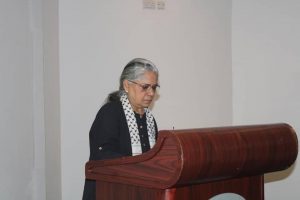
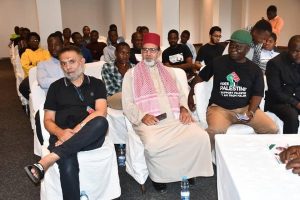
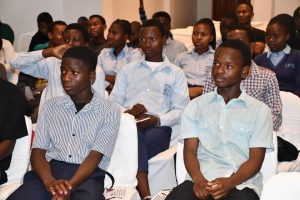
Thereafter, there was a short poem entitled ‘Palestinian Echos’, recited by Sr Tacreema Chikwatu as a prelude to the main session of the event followed by a plenary session where the whole audience were invited to comment, discuss and deliberate — facilitated by veteran journalist, Tailos Bakili.
“What came through quite clearly from this is the knowledge and information gap on this topic as many were under the misconception that it is a religious conflict with Islamist terrorists attacking the Jewish population that is rightfully there,” said the Movement.
The gathering also came up with possible way forward for the Movement, which include increase organisation of such events towards a better informed public; public gatherings as well at universities and schools and engagement with Malawi media houses to give them an accurate and true picture of what is happening on the ground rather than the distorted and biased newsfeeds they are getting from various international news sources.
The Movement is also engaging with the media and to invest in a robust and strong social media strategy to maximise the reach on this important topic as well as to keep the discussion alive on the Israel-Palestine conflict rather than only when there is a problem.




Advertisement
Meanwhile, a BBC report said resumption of fighting between Israel and Hamas has been met with a mixture of fear and anger in Gaza, with the UN calling it a “nightmare”.
A temporary ceasefire expired at 07:00 (05:00 GMT) on Friday with both warring sides blaming each other. Since then, Gaza’s Hamas-run health ministry says 178 people have been killed in Israeli attacks.
A UN official is quoted as saying much-needed aid had stopped coming through the Rafah crossing since the ceasefire ended and on Friday morning, the sound of heavy gunfire could be heard in areas of northern Gaza infiltrated by the Israeli military, with clashes breaking out between Israeli soldiers and Hamas fighters.
There seemed to be no let up in the pace of fighting after the ceasefire, with jet fighters and reconnaissance planes deployed.
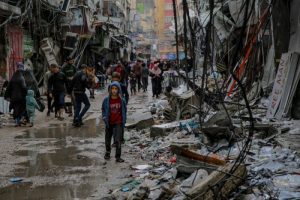
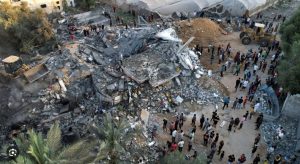
Areas targeted by air strikes included north-western Gaza and Khan Younis in the south — where hundreds of thousands of people fled earlier in the war to escape fighting in the north. Houses in the city were targeted including one house in close proximity to Nasser hospital, where the BBC Arabic team was based.
“Around 06:30 the drones started flying,” Mohammad Ghalaiyini, a Briton who is currently in Khan Younis with his family, said in a voice message sent to the BBC. “Around 07:30, I think, the bombings started and there’s been like non-stop bombing every 10, 15, 20 minutes.”
Leaflets dropped by the Israel Defense Forces (IDF) warned that areas east of Khan Younis and Salah al-Din were “dangerous” combat zones and urged people in some parts to head to shelters further south in Rafah, close to the Egyptian border.
Meanwhile, Hamas and other groups fired rockets at Israel, which deployed its Iron Dome defence system to intercept them.

Advertisement
The renewed clashes were “catastrophic for the people of Gaza,” James Elder, a spokesman for the UN children’s agency, UNICEF, told the BBC, who also said Nasser hospital — which he said was now Gaza’s biggest functioning medical facility — was “wildly overflowing with children and people with wounds of war recovering from the last attack”.
He said many families had been sleeping on mattresses at the hospital for weeks: “This hospital cannot possibly cope with a surge in wounds from the battlefield with more children with burns, with those horrendous shrapnel injuries.”
Other UN aid agencies have described similar conditions at other hospitals and that the situation at al-Ahli Hospital in Gaza City was “like a horror movie” even before the bombing started again, World Health Organization (WHO) senior emergency officer Rob Holden said.
His team — who visited the site earlier in the week — reported patients with “the most horrific injuries” lying on floors “running with blood”, while the bodies of those who had been killed were lined up in the car park outside.

Advertisement
Richard Peeperkorn, WHO’s representative in the Palestinian territories, said only 18 of Gaza’s 36 hospitals are “minimally to partially functional” and that “Gaza’s health system has been crippled by the ongoing hostilities. We are extremely concerned about the resumption of violence.”
There is also major concern over the wider humanitarian situation in Gaza, which is likely to worsen as fighting resumes as supplies of cooking gas, food and water are dangerously low, shops are empty and there is not enough aid to distribute to displaced people.
Many are sleeping in tents and have told the BBC they are struggling to cope with the cold weather conditions. They are desperately urging for more aid including warm clothing to be delivered.
They also say very little water, food and medicine is reaching hospitals and Philippe Lazzarini, the head of the UN’s relief agency for Palestinian refugees, Unrwa, said he was beyond mere concern that “no humanitarian aid has been allowed into Gaza today including fuel”.
Hundreds of trucks carrying aid were able to enter Gaza during the seven-day ceasefire but they were still fewer in number than the roughly 500 trucks that entered Gaza every day before the war.
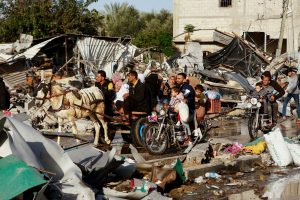
On Friday, Mark Regev, senior adviser to the Israeli prime minister, said Hamas could have ensured the pause in fighting was extended if they had freed more hostages.
“They have close to 20 women [eligible for release] in the framework of the existing agreement, yet they chose not to do so,” Regev told the BBC and asked whether those women were civilians or Israeli soldiers, Regev said some of the women were in their 20s and had finished their military service.
For its part, Hamas says it did make several offers regarding further hostage releases — all of which were rejected by Israel, whose IDF said its military strikes on Friday had hit Hamas command centres, underground sites and groups of Hamas fighters.
Officials in Gaza say more than 14,800 people including about 6,000 children have been killed since Israel began its military campaign against Hamas there, with thousands more believed to be dead under rubble.
It follows Hamas’s attack on Israel on October 7 during which it killed about 1,200 people and kidnapped 240 others.—BBC report by Adnan Elbursh, BBC Arabic & Alys Davies in Khan Younis and London

Advertisement
